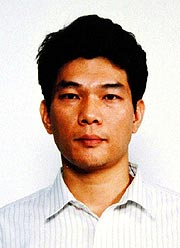Mamoru Takuma
Mamoru Takuma
Mamoru Takuma was a Japanese man who gained notoriety for his actions on June 8, 2001, when he carried out a mass stabbing at an elementary school in Ikeda, Osaka, Japan. The incident, known as the Osaka school massacre, resulted in the deaths of eight children and the injury of 13 others.
Background[edit | edit source]
Mamoru Takuma was born on September 13, 1966, in Japan. He had a history of mental health issues and had been previously hospitalized for psychiatric treatment. Takuma had also expressed feelings of resentment and anger towards society.
Osaka School Massacre[edit | edit source]
On the morning of June 8, 2001, Mamoru Takuma entered the Ikeda Elementary School armed with a kitchen knife. He proceeded to stab and attack students and teachers indiscriminately. The attack resulted in the tragic deaths of eight children and injuries to 13 others.
Arrest and Trial[edit | edit source]
Following the massacre, Mamoru Takuma was apprehended by authorities at the scene. He was subsequently charged with multiple counts of murder and attempted murder. During his trial, Takuma expressed remorse for his actions but also cited his frustrations with society as a motive for the attack.
Verdict and Execution[edit | edit source]
In September 2003, Mamoru Takuma was found guilty of the murders and sentenced to death. Despite appeals for a retrial, his sentence was upheld. Takuma was executed by hanging on September 14, 2004, at the Osaka Detention House.
Legacy[edit | edit source]
The Osaka school massacre perpetrated by Mamoru Takuma remains one of the most tragic incidents of school violence in Japan's history. The event sparked discussions on mental health awareness, school safety measures, and the importance of early intervention for individuals with psychiatric issues.
Search WikiMD
Ad.Tired of being Overweight? Try W8MD's physician weight loss program.
Semaglutide (Ozempic / Wegovy and Tirzepatide (Mounjaro / Zepbound) available.
Advertise on WikiMD
|
WikiMD's Wellness Encyclopedia |
| Let Food Be Thy Medicine Medicine Thy Food - Hippocrates |
Translate this page: - East Asian
中文,
日本,
한국어,
South Asian
हिन्दी,
தமிழ்,
తెలుగు,
Urdu,
ಕನ್ನಡ,
Southeast Asian
Indonesian,
Vietnamese,
Thai,
မြန်မာဘာသာ,
বাংলা
European
español,
Deutsch,
français,
Greek,
português do Brasil,
polski,
română,
русский,
Nederlands,
norsk,
svenska,
suomi,
Italian
Middle Eastern & African
عربى,
Turkish,
Persian,
Hebrew,
Afrikaans,
isiZulu,
Kiswahili,
Other
Bulgarian,
Hungarian,
Czech,
Swedish,
മലയാളം,
मराठी,
ਪੰਜਾਬੀ,
ગુજરાતી,
Portuguese,
Ukrainian
Medical Disclaimer: WikiMD is not a substitute for professional medical advice. The information on WikiMD is provided as an information resource only, may be incorrect, outdated or misleading, and is not to be used or relied on for any diagnostic or treatment purposes. Please consult your health care provider before making any healthcare decisions or for guidance about a specific medical condition. WikiMD expressly disclaims responsibility, and shall have no liability, for any damages, loss, injury, or liability whatsoever suffered as a result of your reliance on the information contained in this site. By visiting this site you agree to the foregoing terms and conditions, which may from time to time be changed or supplemented by WikiMD. If you do not agree to the foregoing terms and conditions, you should not enter or use this site. See full disclaimer.
Credits:Most images are courtesy of Wikimedia commons, and templates, categories Wikipedia, licensed under CC BY SA or similar.
Contributors: Prab R. Tumpati, MD

